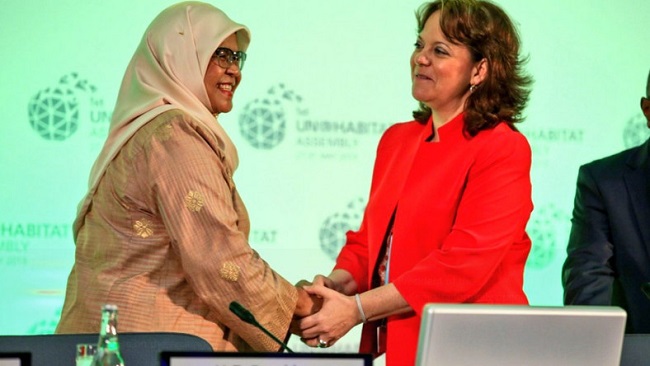On Monday, May 27, 2019, the first ever session of the Assembly of the UN Human Settlements Programme (UN-Habitat) (UNHA 1) started its deliberations at the UN Office at Nairobi (UNON), Kenya. Following UN-Habitat’s restructuring, its Assembly replaces the Governing Council and will be the highest-level decision-making body on sustainable urbanisation and human settlements.

At the inaugural session, delegates adopted several important decisions for the Assembly’s operationalisation, including election of officers. They further heard keynote speeches and discussed progress towards the implementation of the New Urban Agenda and Sustainable Development Goal 11 (sustainable cities and communities).
Delegates elected Martha Delgado Peralta, a Mexican, as President of the Assembly, as well as regional Vice-Presidents, members of the Executive Board, and other officers, and adopted the meeting’s agenda and rules of procedure. Throughout the day, several platforms were opened, including the Urban Solutions Expo, the City Stage, and the Youth Tent.
Maimunah Mohd Sharif, Acting Director-General, UN Office at Nairobi (UNON) and UN-Habitat Executive Director, opened the UNHA 1. James Ohayo, UN Habitat Secretariat, moderated the session.
Emma Stevens, Indigenous Youth Representative from the Mi ꞌkmaq Indigenous Peoples, Canada, paid tribute to women in her community who lost their lives due to unsustainable development practices, and drew attention to the loss of traditional languages, calling for greater efforts to conserve them.
Sharif proposed and delegates agreed to elect the President under the UN General Assembly rules of procedure, pending adoption of the UNHA’s rules of procedure, leading to Peralta’s election by acclamation.
Shipra Narang-Suri, Coordinator, Urban Planning and Design Branch, UN-Habitat, underscored the UNHA as “a new chapter in the organisation’s history,” noting that more than half of the world’s population lives in cities and is connected to the internet. She stressed the need to reduce digital inequality and emphasised the importance of green, open, public spaces, directly linked to the Sustainable Development Goals (SDGs), in particular target 11.7 (universal access to safe, inclusive, green spaces). Narang-Suri then introduced an innovative way to enhance stakeholders’ participation in redesigning green spaces at the UN Headquarters in Gigiri, using the videogame Minecraft in that respect.
UNHA President Delgado underscored UN-Habitat’s Strategic Plan, stressing the need for collective efforts to produce innovative solutions for sustainable urban development. She highlighted the importance of adopting policies to simultaneously advance social inclusion, environmental protection, and economic growth.
Maimunah Mohd Sharif highlighted UNON’s role as the only UN Headquarters in the developing world, drawing attention to work on infrastructure and efforts to become a more environmentally friendly compound, including through eliminating single-use plastics.
UN Secretary-General António Guterres, via video message, stressed that the first UNHA comes at an important juncture as 60% of the urban infrastructure needed by 2030 is yet to be built. He emphasised that well planned cities can facilitate economic growth and sustainable low emission development. He further cautioned that unplanned urbanisation can generate severe problems, such as pollution, crime, inequality, disease, vulnerability to disaster, lack of affordable housing, and harmful emissions, urging for ambitious and concrete solutions to overcome these challenges.
Joyce Msuya, Acting Executive Director, UN Environment Programme (UNEP), pointed to opportunities for success including: incorporating circularity into the planning of cities; innovating to ensure housing needs do not strain natural resources; integrating cooling infrastructure in urban spaces; ensuring environmental considerations guide development decisions; and increasing the capacities of local governments to implement change.
Ridwan Kamil, Governor of West Java Province, Indonesia, shared his experience in “making and designing happiness” in the urban context. He encouraged decision makers to plan for happiness in urban planning through, inter alia, building social infrastructure, redesigning public spaces, and restructuring public services’ provision.
Sona Jobarteh, UN-Habitat’s Goodwill Ambassador, The Gambia, reflected on what successful urbanisation entails and how it could be developed sustainably. She underscored the importance of culture and the need to reflect it in communities’ social values. She called for a change in mentality and understanding, stressing that sustainability entails more than “new shiny buildings” and extends to knowing what is going on inside.
UN-Habitat Executive Secretary Sharif highlighted three priorities: well-planned and better managed cities; the need for transformational and ground-breaking innovation for a better quality of life; and a resourced and impact-driven UN-Habitat. On the impact of UN-Habitat’s work, she pointed out that more than two million people have improved access to water and sanitation and 53 cities in 30 countries, have benefited from state-of-the-art design solutions.
Uhuru Kenyatta, President of Kenya, stressed that UN-Habitat’s new governance structure lifts the organisation’s status to a universal body. He emphasised that the world “is currently ill-prepared to plan effectively for rapid urbanisation,” noting that many countries have seen a proliferation of slums and informal settlements, urban poverty, and increased environmental degradation. President Kenyatta called for collective international action informed by technological innovations to “transform our cities into engines of sustainable economic growth and development.”
He called for overcoming institutional constraints and ensuring the necessary capacity- and resource-base for UN-Habitat to deliver its mandate. He further outlined national efforts to implement the New Urban Agenda under four key priority areas, including mortgage funding, universal health care, affordable housing, and infrastructure development, and stressed Kenya’s commitment in supporting UN-Habitat’s work.
